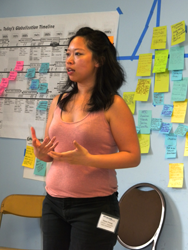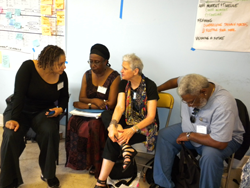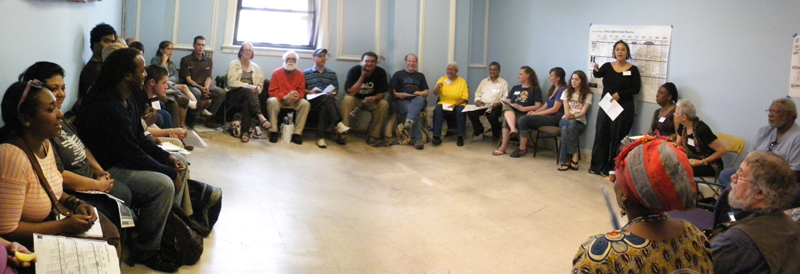GGJ Members led a jam-packed interactive workshop at the Nato-Free Summit in Chicago on May 19th, the day before the NATO summit. The workshop kicked off with discussions of how immigration patterns around the world often follow war timelines, creating trauma but also forcing people to become leaders for justice. As funds are diverted away from social programs, we see how shock, war, and death are normalized. The military creates conflict in families. Violence, militarism, and war affect all of our lives, making an impression that is imprinted on us for our whole lives.
 Participants first broke down the 20th century into a timeline of events that have brought us to the current moment, highlighting key economic and political events that show the progression of economic and political movements bringing us to the current moment. With these key moments in mind, participants were introduced to the GGJ framework, which was a similar process of GGJ organizations coming together around converging crises. War, warming, and economy have critical overlap, which indicate it is imperative for us to build another system. The emphasis is on moving money from war to social needs, and recognizing that the green economy as a false solution (see GGJ’s petition on the “Greed” Economy).
Participants first broke down the 20th century into a timeline of events that have brought us to the current moment, highlighting key economic and political events that show the progression of economic and political movements bringing us to the current moment. With these key moments in mind, participants were introduced to the GGJ framework, which was a similar process of GGJ organizations coming together around converging crises. War, warming, and economy have critical overlap, which indicate it is imperative for us to build another system. The emphasis is on moving money from war to social needs, and recognizing that the green economy as a false solution (see GGJ’s petition on the “Greed” Economy).
The next activity helped identify and connect the work that participants were involved in that linked everyone to a global movement. Exhibiting that what happens in one part of the world necessarily impacts what happens in other parts of the world in this moment. The following are some areas of work that participants reported on:
- Clevelanders Against Poverty confront the history of people trying to sustain national globalization on the backs of poor people.
- An independent real estate agent is helping people stay in their houses, fighting evictions from foreclosures, and negotiating loans with banks.
- People’s Tribune is making people aware that they are not fighting bad people but a bad system.
- An Earlham College environmental group is reclaiming endowments, divesting from coal companies, and reinvesting in clean energy. They are attempting to change policy by working with groups on campus and some community groups.
The goal is grassroots internationalism or linking with people around the world, so the next section of the workshop was a communal visioning process of what success would look like. Some visions and realities that participants shared were:
- In Detroit we have started moving people into shut down homes, and people are really doing it.
- 70% of people live in cities now, but in the future we will be living on community land trusts.
- Communities are engaged in participatory budgeting where money is given back to local populations to decide what to do in their neighborhoods.
 The final vision was one in which NATO is shut down, climate is restored, and the earth is regenerated. Within this, Charity Hicks, a GGJ delegate from East Michigan Environmental Action Council (EMEAC), envisioned that, “…[i]n our communities, we are in a relationship with each other. We treat others how we want to be treated. There is nobody who is less than [us], and we treat each other with respect. The earth has been respected and we have enough.”
The final vision was one in which NATO is shut down, climate is restored, and the earth is regenerated. Within this, Charity Hicks, a GGJ delegate from East Michigan Environmental Action Council (EMEAC), envisioned that, “…[i]n our communities, we are in a relationship with each other. We treat others how we want to be treated. There is nobody who is less than [us], and we treat each other with respect. The earth has been respected and we have enough.”
Finally, it was important to lay the foundation for a bridge to lead from what we are doing now to where we want to be. The following strategies were discussed to strengthen the work we are all doing:
- Broaden coalitions and follow unified agenda
- Current technology can stop poverty, but also a systemic change to get rid of the profit motive
- Built in structure to mobilize thousands—bring together groups around budget time and get ahead of the budget schedule.
- Challenge 501(c)3 control of organizing, perhaps through community funds organizing.
As GGJ National Coordinator Cindy Wiesner said, “We need more conversations about strategies that are informed by what we do now. We need to be grounded in our work but also move beyond our comfort zones. Because of these multiple crises we need to address them in a different way, [we need] more strategy sessions, more getting into the streets.”

